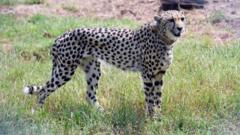Authorities at India's Kuno National Park have begun disciplinary proceedings against a driver employed at the sanctuary, who was filmed giving water to a cheetah and her cubs in a widely circulated video. The man reportedly broke established guidelines prohibiting unauthorized personnel from approaching the big cats. These cheetahs were declared extinct in India in 1952, with a reintroduction initiative launched in 2022 aimed at restoring their population.
The incident surfaced on Sunday, showcasing the worker pouring water into a metal pan after being encouraged by bystanders, unseen in the footage. As captured in the video, a cheetah named Jwala and her four cubs approached the pan to drink. Park officials explained that while it is not unusual for trained staff to provide water to big cats near the park boundary to prevent conflicts, only authorized employees are allowed to do so.
Uttam Kumar Sharma, Additional Principal Chief Conservator of Forests, conveyed the stringent regulations governing interactions with cheetahs. "There are clear instructions to move away from cheetahs. Only authorized persons can go in close proximity to them to perform a specific task," he emphasized. Initial media descriptions of the video deemed it "heartwarming," but many social media users voiced concerns regarding potential risks to both humans and animals, advocating for the establishment of ponds within the park to provide a more permanent water solution for the cheetahs during summer months.
The situation surrounding the cheetah population remains tense, as local villages experience issues with the animals entering their fields and attacking livestock. Past incidents have seen villagers resorting to throwing stones at the big cats to protect their herds. Park officials are currently working to raise local awareness about coexisting with wildlife.
Since the start of the reintroduction program, a total of twenty cheetahs have been relocated from South Africa and Namibia to Kuno National Park between 2022 and 2023. Tragically, eight of these cheetahs have died due to various causes, which has raised concerns regarding the suitability of Kuno's conditions. Specialists involved in the project have called for improved monitoring and veterinary care following the deaths of these animals, as inadequacies in record-keeping and staff expertise have been flagged.
Despite these critiques, park authorities maintain that there are now a total of 26 cheetahs in the park, with 17 living in the wild and nine held in enclosures. Looking ahead, India is set to welcome 20 additional cheetahs from South Africa, with a selection already made in collaboration with South African officials.


















